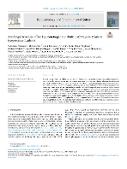Antifungal triazoles affect key non-target metabolic pathways in Solanum lycopersicum L. plants

Autor
Jakl, Michal
Zeljković, Sanja Ćavar
Vrobel, Ondřej
Datum vydání
2023Publikováno v
Ecotoxicology and Environmental SafetyRočník / Číslo vydání
268 (December)ISBN / ISSN
ISSN: 0147-6513ISBN / ISSN
eISSN: 1090-2414Metadata
Zobrazit celý záznamKolekce
Tato publikace má vydavatelskou verzi s DOI 10.1016/j.ecoenv.2023.115729
Abstrakt
Several 1,2,4-triazoles are widely used as systemic fungicides in agriculture because they inhibit fungal 14ɑ-demethylase. However, they can also act on many non-target plant enzymes, thereby affecting phytohormonal balance, free amino acid content, and adaptation to stress. In this study, tomato plants (Solanum lycopersicum L. var. 'Cherrola') were exposed to penconazole, tebuconazole, or their combination, either by foliar spraying or soil drenching, every week, as an ecotoxicological model. All triazole-exposed plants showed a higher content (1.7-8.8 x) of total free amino acids than the control, especially free glutamine and asparagine were increased most likely in relation to the increase in active cytokinin metabolites 15 days after the first application. Conversely, the Trp content decreased in comparison with control (0.2-0.7 x), suggesting depletion by auxin biosynthesis. Both triazole application methods slightly affected the antioxidant system (antioxidant enzyme activity, antioxidant capacity, and phenolic content) in tomato leaves. These results indicated that the tomato plants adapted to triazoles over time. Therefore, increasing the abscisic and chlorogenic acid content in triazole-exposed plants may promote resistance to abiotic stress.
Klíčová slova
amino acids, antioxidant enzyme, phytohormones, penconazole, tebuconazole
Trvalý odkaz
https://hdl.handle.net/20.500.14178/2252Licence
Licence pro užití plného textu výsledku: Creative Commons Uveďte původ-Neužívejte dílo komerčně-Nezpracovávejte 4.0 International







